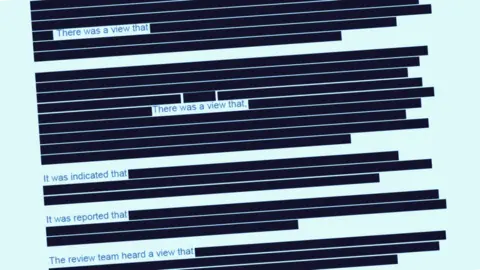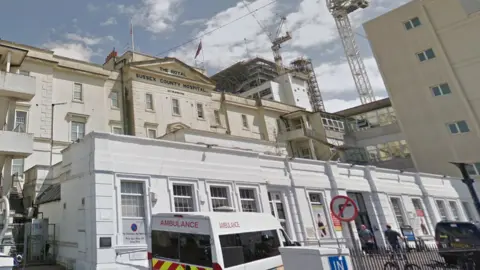University Hospitals Sussex urged to release review findings
 BBC
BBCAn NHS trust has been urged to publish the full findings of an independent review of its services after it released a heavily redacted report.
University Hospitals Sussex has refused to reveal the recommendations made after a review by the Royal College of Surgeons in 2019.
A patients' group said the findings should be "in the public domain".
The trust said the review of its neurosurgery department "did not highlight any safety concerns".
The review was discovered as part of a BBC Panorama investigation into unpublished patient safety reports.
A heavily edited report was released under freedom of information laws.
It showed the trust asked the Royal College of Surgeons to look at "concerns raised in respect of clinical outcomes, allocation of sub-specialties and governance arrangements".
All issues and recommendations were obscured, with only positive feedback disclosed.
 Google
GoogleDavid Liley, chief executive of Healthwatch Brighton and Hove, said: "We've no evidence there is any smoking gun, but of course if there is it should be in the public domain; if there isn't we should have the reassurance."
An investigation of a maternity scandal at Morecambe Bay in 2015, in which 11 babies and one mother died, led to recommendations that trusts openly report the findings of any external investigation.
Dr Bill Kirkup, who led the inquiry, told BBC Panorama it was a "great disappointment" that royal college reports were still not being made public.
"I can't understand what the rationale would be for withholding the existence of a report or the findings of the report," he said.
'Positive portrayal'
After the BBC appealed its decision to redact much of the report, the trust said in a letter that revealing more details would "inhibit the free and frank" exchange of views and would have a "chilling effect" on the willingness of staff to participate in any future reviews.
However, it said it had decided to disclose additional information where it "portrayed the services positively or would likely cause minimal harm".
It said it hoped this would "provide assurance and demonstrate that patient satisfaction associated with these services was 'good' and that the quality of these services was 'high'."
In one section about the management of "complications and surgical techniques" the trust redacted all of the review's findings, with the exception of a single sentence that showed the hospital was not "an outlier in any outcomes when compared with peers".
In a factual section, the number of incidents was included in a table.
The trust chose to reveal the number of incidents resulting in "no harm" and "low" harm, but redacted the number of incidents resulting in "moderate" and "severe" harm.
'Confidential information'
Medical director Dr Rob Haigh said the royal college was invited to "share their expert views on how we could improve" and while no safety issues were found, a "number of useful recommendations" were made.
"We have made improvements aligned to these recommendations and the college has now concluded its work with us," he said.
The full report could not be released as it "contains confidential information," he added.
The trust said it had spoken to the Care Quality Commission about the key issues in the review and its approach to improvements.
